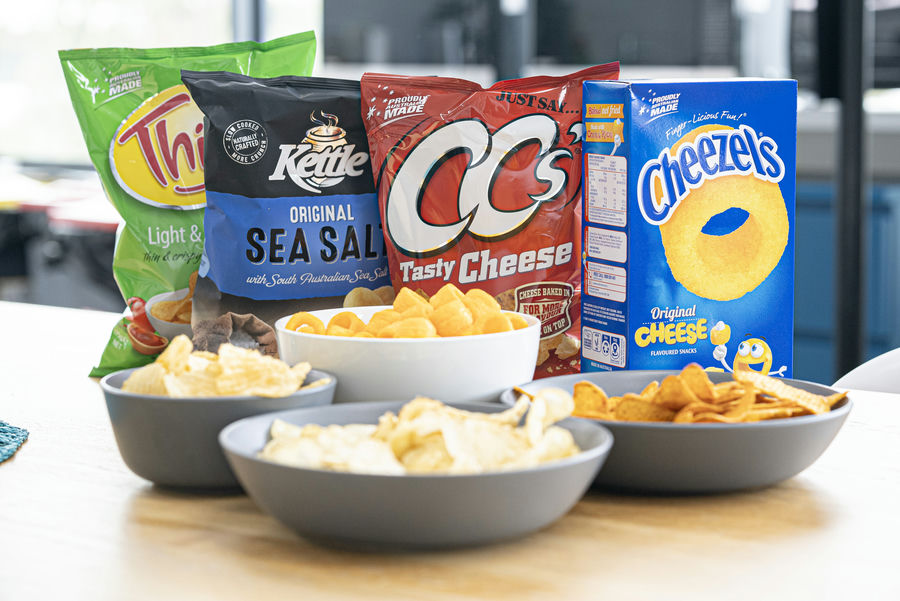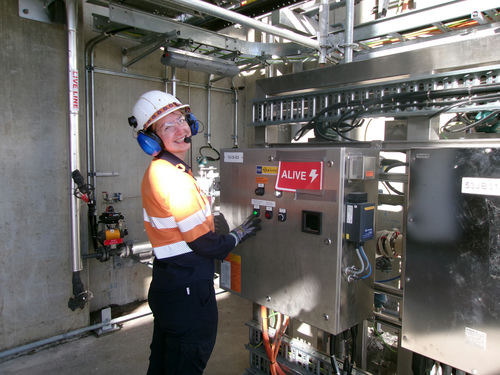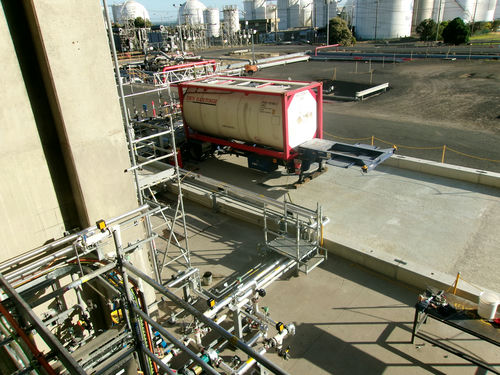.jpg)
The refinery is a critical asset for Australia, operating in Geelong for more than 70 years, supplying the fuels and products vital to the economy.
The refinery has a range of units that convert crude oil into usable products. A special unit, the Residue Catalytic Cracking Unit (RCCU) or known simply as the ‘cracker’, has the potential to process pyrolysis oil made from waste soft plastics along with waste food oils. The refinery produces the feedstock for the connecting polymer plant that can subsequently produce a polymer resin with recycled or biogenic content for use in the production of soft plastic packaging.
“The concept of co-processing using the refinery infrastructure is an exciting one and is forming part of our Viva Energy Hub transformation. We’re well-positioned to take a variety of waste or biogenic feedstocks in the near future and reduce our use of crude oil,” said James Harrington, Sales & Commercial Manager at Viva Energy Australia.
“For soft plastics, we are excited about the opportunity to effectively close the loop at a local level via Viva Energy’s critically important infrastructure, through our converters, our customers and of course end consumers who we know want to recycle more of their waste.”
Used cooking oil innovation delivers unique pathway for soft plastic solutions
A trial project at our Geelong Refinery is helping to prove the potential of used cooking oil (UCO) as a pathway to making new soft plastics solutions.
In partnership with Intersnack ANZ, owners of Snackbrands Australia, the trial involved diverting UCO that would otherwise be exported overseas, into creating locally produced sustainable food-grade plastic packaging. The UCO came from cooking some of Australia’s favourite snacks like Kettle Chips, CC’s, Natural Chip Company, Cheezels and Thins. The UCO was then processed through the refinery to produce the required feedstock for the polymer plant – ultimately making a ISCC + certified bio-circular polymer. The bio-circular polymer is then converted into ISCC+ certified bio-circular packaging for some of Snackbrands iconic snacks.
Packaging sustainability is critical for manufacturers seeking to cater to an increasingly environmentally conscious consumer market and to align with recycled packaging regulatory schemes expected in the near future.
James explains that brand owner commitments to increase recycled content and reduce the use of virgin plastics have challenged the global polymers industry.
“Helping our customers meet those commitments requires resins that are made with renewably sourced materials that have a lower carbon footprint,” he said.
“This trial proves we’re capable and gives brands the confidence to innovate and invest.”
Partnering with Intersnack ANZ to meet ambitious sustainability targets

Intersnack ANZ, owners of Snackbrands Australia, is the source of the UCO and the ultimate end customer of the food-grade plastic made with a bio-circular polymer. Viva Energy Australia is a customer of Snackbrands Australia via its retail and convenience network.
James said this relationship makes for a unique opportunity to collectively create value and meet ambitions for low-carbon and circular products in the economy.
“Traditionally, we would sell our polymer to a packaging converter without talking to the end brand who uses the soft plastic packaging – up until now, we hadn’t seen the opportunity for the brand owner to supply us with the raw materials,” he said.
Snackbrands Australia Managing Director Mark Fryday said the trial supports a pathway towards reducing scope 3 carbon emissions and meeting the growing sustainability expectations of customers and consumers.
“We’re proud to partner with Viva Energy Australia in this critical first step towards reducing reliance on virgin plastic, and being able to supply used cooking oil for this proof-of-concept trial,” he said.
“We look forward to measuring the impact on emissions and continuing our collaboration to achieve our ambitious sustainability targets.”
How used cooking oil (UCO) becomes packaging for potato chips
%20(1).jpg)
1. Snackbrands Australia cooks its iconic snacks like Kettle Chips, CC’s, Natural Chip Company, Thins and Cheezels in high-quality oil on a commercial scale
2. Scanline (owned by Cleanaway) collects the used cooking oil (UCO)
3. Cleanaway processes the UCO to separate the oil from contaminants and water
4. Cleanaway transfers the clean UCO to an isotainer and delivers it to the refinery
5. The UCO is heated before injection into the RCCU (Residue Catalytic Cracking Unit)
6. The unique RCCU breaks longer chains in the UCO into smaller molecules of propylene
7. Propylene is transferred to our plastics plant and polymerised to make polypropylene that then becomes plastic resin
8. ISCC+ mass balance certified plastic resin is delivered to manufacturers to create packaging that preserves and extends the shelf life of Australia’s favourite chip brands – sold across Viva Energy’s growing retail network


Caption: An isotainer of UCO arrives at the Geelong Refinery for processing.
ISCC+ certification builds credibility
Viva Energy Australia is certified under the International Sustainability and Carbon Certification (ISCC+) scheme, which provides customer transparency on the renewable feedstock content of fuels and resins.
“ISCC+ is a well-established way to think about the circular economy. We’re using the mass balance free attribution model to ensure we’re making the most of existing infrastructure and accurately reflecting any recycled or bio content in our resin products,” James said.
“ISCC+ ensures we can make credible claims that customers can trust.”
James said the UCO trial will also help address Scope 3 emissions for Viva Energy Australia customers.
“Comparable studies overseas estimate savings of up to 75% of the carbon footprint in using a bio-based feedstock as opposed to crude oil,” he said.
“We will undertake a life cycle assessment of the trial to substantiate these numbers in the Australian context.”
A strategic alliance with Cleanaway
Cleanaway and Viva Energy are a step closer towards a large-scale advanced soft plastics recycling facility, after announcing the successful completion of their pre-feasibility study for the project. This project will now move to a full 12-month feasibility and engineering study for both the sorting of the plastic and its transformation into pyrolysis oil.
The project combines Cleanaway’s experience and strategic infrastructure in waste collection and processing with the infrastructure and processing capability of Viva Energy’s refinery and polypropylene plant.
The project proposes transforming soft plastics that are currently sent to landfill into plastic pyrolysis oil (PPO). The process would require a dedicated sorting and mechanical pre-treatment plant and an advanced chemical recycling plant to convert the waste plastic into PPO, a feedstock for co-processing at the Geelong Refinery, and ultimately to food-grade plastic resin.
Recycled plastic manufactured through this process has identical properties to virgin plastic resin – significant for manufacturers and industries with obligations under the Australian Government’s 2025 National Packaging Targets.
|
Sustainable plastic and the 2025 National Packaging Targets
The 2025 National Packaging Targets
(NPTs) are a key commitment from Australian industry and governments to
transition towards a circular economy for packaging made, used and sold
in Australia.
As a signatory to the targets, Viva Energy is committed to the ‘whole of life’ viewpoint regarding packaging material usage in Australia.
|
Partnerships key to a sustainable future
Partnering with businesses that share a sustainability vision, such as Intersnack ANZ and Cleanaway, is key to developing innovative and circular economy opportunities.
“The UCO trial could not have gone ahead without collaboration and cooperation from a range of stakeholders,” James said.
“It’s an exciting time to be at the forefront of polymers and soft plastics capabilities in Australia – and collaboration sparks the innovation we need in this sector.”
James said that the excitement has extended to the Geelong team.
“Our refinery team is excited at the prospect of delivering these innovative solutions for our customers and the community. They have chip packets pinned to their notice board as a reminder of what we’re trying to do,” he said.
“It’s fantastic to see the entire business come together so purposefully.”
Read more about Polymers